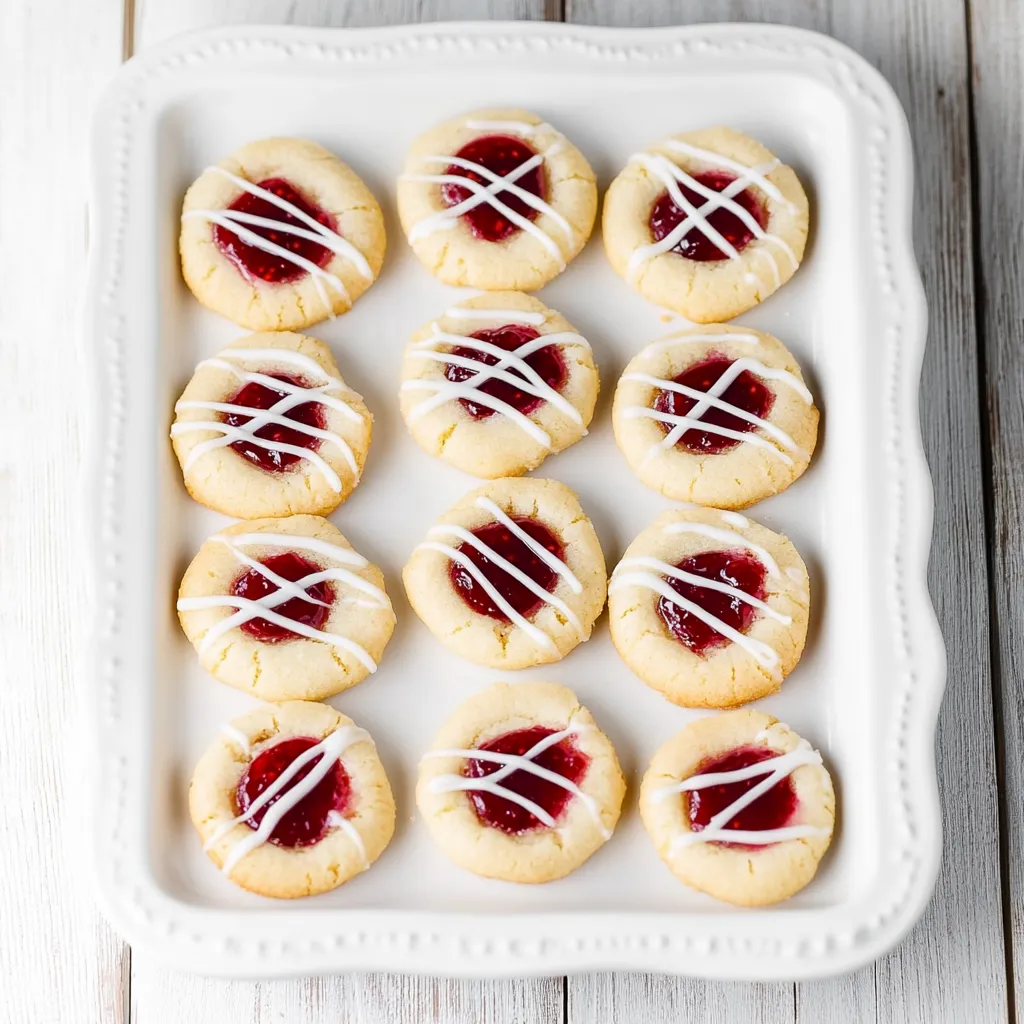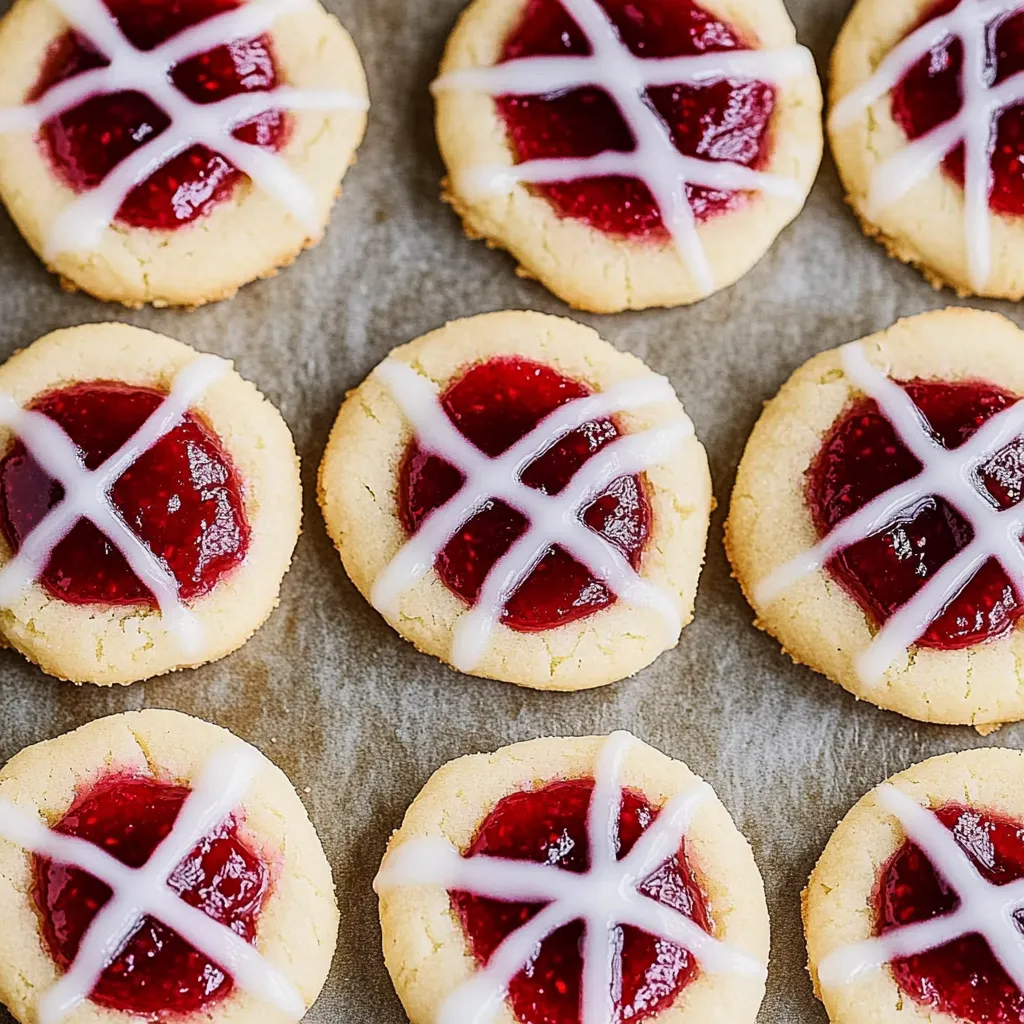 Pin it
Pin it
These raspberry almond shortbread thumbprints combine the classic appeal of buttery shortbread with the sophisticated flavor pairing of sweet raspberry jam and fragrant almond extract. What makes them truly special is the tender, crisp texture that literally melts in your mouth while delivering that perfect balance of tart fruit and nutty sweetness. The delicate almond drizzle on top creates an elegant finish that transforms these simple cookies into something that looks professionally made but remains completely achievable for home bakers.
I first made these for a neighbor's retirement party where I wanted something that felt special but wasn't overly complicated. The combination of that tender shortbread texture with the bright raspberry flavor became an instant hit, and now they're my go-to choice whenever I want to impress without spending all day in the kitchen.
Essential Ingredients and Selection Tips
- High-quality unsalted butter: Since butter is the primary flavor in shortbread, using premium brands like Land O'Lakes makes a noticeable difference in both taste and texture
- All-purpose flour measured correctly: Too much flour creates dry, crumbly dough that won't hold together properly; spoon flour into measuring cups rather than scooping
- Quality raspberry jam: Choose seedless varieties from reputable brands like Smucker's or Stonewall Kitchen for the best flavor and consistency
- Pure almond extract: This provides the signature flavor that distinguishes these cookies; avoid imitation extract which can taste artificial
Detailed Step-by-Step Instructions
- Create the perfect shortbread base:
- In a large mixing bowl, cream the room temperature butter with granulated sugar using an electric mixer until light and fluffy, about 3-4 minutes. The mixture should look pale and increased in volume. Beat in the almond extract thoroughly, ensuring it's evenly distributed throughout the butter mixture.
- Incorporate flour with precision:
- In a separate bowl, whisk together the all-purpose flour and salt. Gradually add this to the creamed butter mixture, mixing on low speed just until the dough comes together. The dough should feel soft and pliable, not dry or crumbly. If it seems too dry, add a teaspoon of softened butter; if too wet, add a tablespoon of flour.
- Chill for optimal handling:
- Wrap the dough in plastic wrap and refrigerate for at least one hour, or up to overnight. This chilling step is crucial for preventing the cookies from spreading too much during baking. Cold dough holds its shape better and creates those perfect thumb indentations.
- Shape with care and precision:
- Preheat your oven to 350 degrees Fahrenheit. Remove only a portion of the chilled dough at a time, keeping the rest refrigerated. Roll the dough into 1-inch balls using your hands, placing them on parchment-lined baking sheets spaced about 2 inches apart.
- Create perfect indentations:
- Using your thumb or the back of a small spoon, press straight down into the center of each dough ball, going about halfway through the cookie. The indentation should be deep enough to hold jam but not so deep that it goes all the way through. Too-deep holes cause excessive spreading during baking.
- Fill with jam strategically:
- Spoon about half a teaspoon of raspberry jam into each indentation, filling it completely but not overflowing. The jam will bubble slightly during baking but shouldn't spill over the edges if properly measured.
- Bake for perfect texture:
- Bake for 12-15 minutes, until the cookies are set and just beginning to turn golden brown on the bottom edges. The tops should remain pale with only the slightest hint of color. Overbaking creates hard, dry cookies instead of the tender texture you want.
- Cool and finish elegantly:
- Let cookies cool on the baking sheet for 5 minutes before transferring to a wire rack to cool completely. Once cooled, prepare the almond glaze by whisking together powdered sugar, almond extract, and enough milk to create a drizzling consistency. Use a fork or small spoon to drizzle the glaze decoratively over each cookie.
 Pin it
Pin it
My family requests these cookies for every special occasion, and I've caught guests sneaking seconds before finishing their dinner. The combination of that buttery, melt-in-your-mouth texture with the bright fruit flavor creates something truly irresistible.
Mastering the Perfect Shortbread Texture
The key to exceptional shortbread lies in understanding how the ingredients work together. Properly creamed butter creates tiny air pockets that make the cookies tender, while the correct flour-to-butter ratio ensures they hold together without becoming tough. Room temperature butter is crucial - cold butter won't cream properly, while overly warm butter makes the dough too soft to handle.
Jam Selection and Preparation Tips
While raspberry jam is classic, this recipe works beautifully with other high-quality preserves. Apricot jam creates elegant, sophisticated cookies, while strawberry provides familiar comfort. For special occasions, consider using premium artisanal jams or even homemade preserves. Always choose seedless varieties to maintain the smooth, professional appearance.
Advanced Drizzling Techniques
The almond glaze adds both flavor and visual appeal when applied correctly. For the most elegant appearance, use a fork to create thin, delicate lines rather than thick dollops. Allow the first drizzle to set slightly before adding decorative crosshatch patterns. The glaze should be thin enough to drizzle easily but thick enough to maintain its pattern.
Storage and Make-Ahead Strategies
These cookies store beautifully when handled properly. Layer them between wax paper in airtight containers, keeping them refrigerated if stacking multiple layers. The shortbread base actually improves in flavor after a day, as the almond extract mellows and integrates. For make-ahead preparation, bake and fill the cookies but wait to add the glaze until serving day.
Troubleshooting Common Problems
Dry, crumbly dough usually indicates too much flour or insufficient butter creaming. Cookies that spread too much typically result from warm dough or overly deep indentations. If jam bubbles over during baking, reduce the amount slightly or ensure the indentations aren't too shallow. Tough cookies often indicate overmixing after adding flour.
These cookies represent the perfect balance of simplicity and sophistication. While the technique is straightforward, the attention to detail in each step creates results that look and taste professionally made. They've become my signature cookie because they never fail to impress while remaining completely manageable for home bakers of any skill level.
Frequently Asked Questions
- → Can I use other jam flavors instead of raspberry?
- Yes! Strawberry, apricot, or cherry jam work great. Just make sure it's seedless and thick enough to stay in the cookie wells.
- → Why do my cookies spread too much during baking?
- The dough needs to stay cold. Keep it chilled between batches and don't make the thumbprint holes too deep or wide.
- → How long do these cookies stay fresh?
- Store in an airtight container for up to one week at room temperature. You can also freeze them for up to 3 months.
- → Can I make the dough ahead of time?
- Absolutely! The dough can be made up to 2 days ahead and kept covered in the fridge. Just bring to room temperature before shaping.
- → What if I don't have almond extract?
- You can substitute vanilla extract in the same amount, or skip it entirely. The cookies will still taste delicious.
